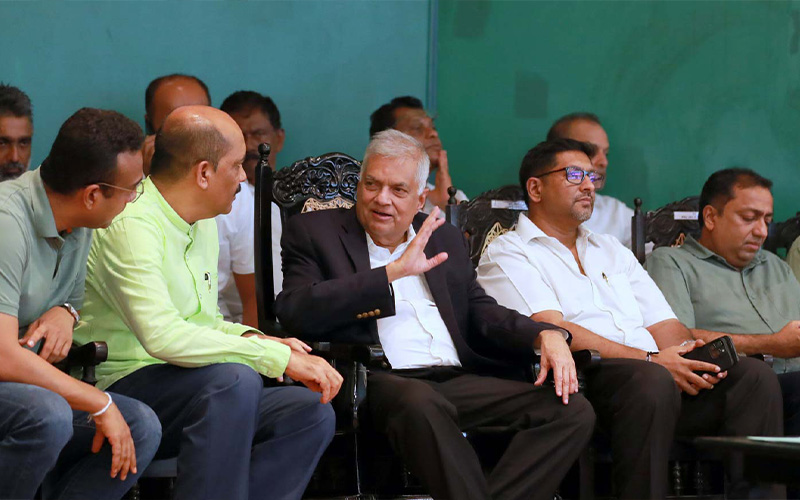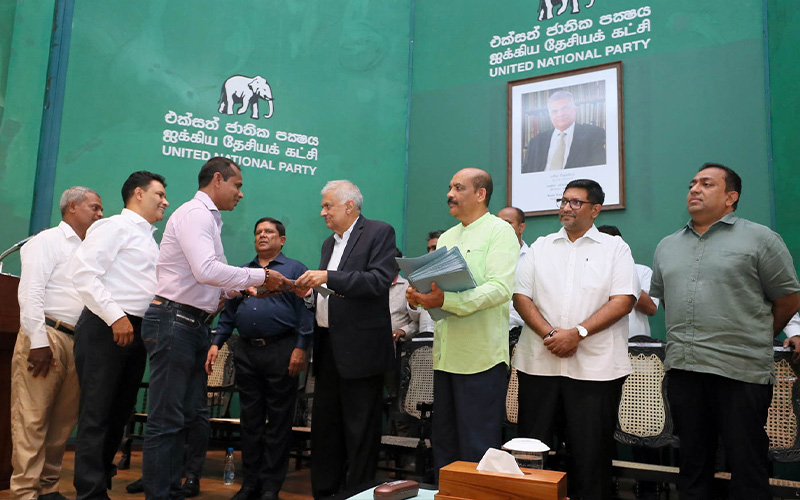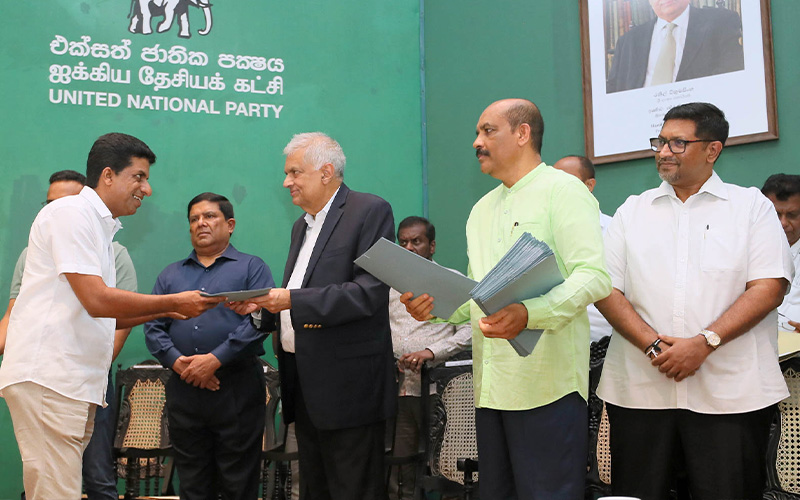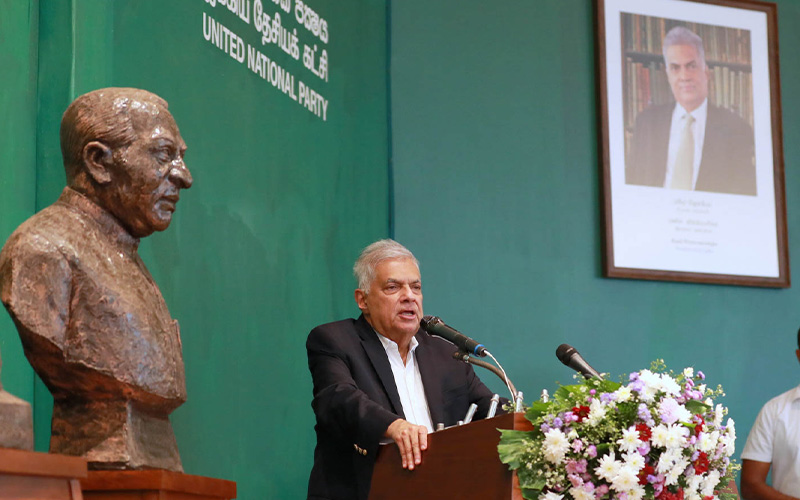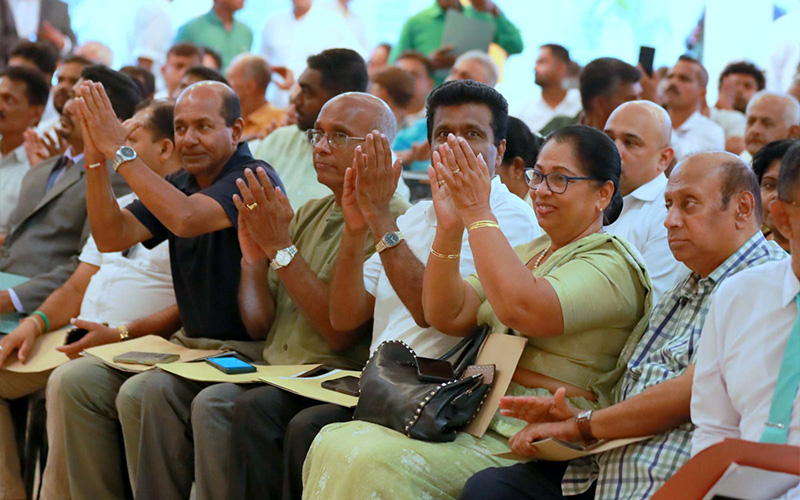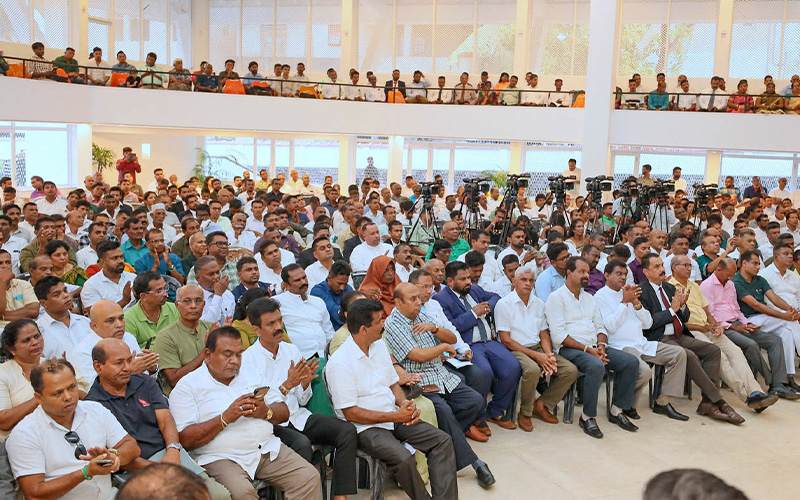It’s easy to criticize but hard to find solutions
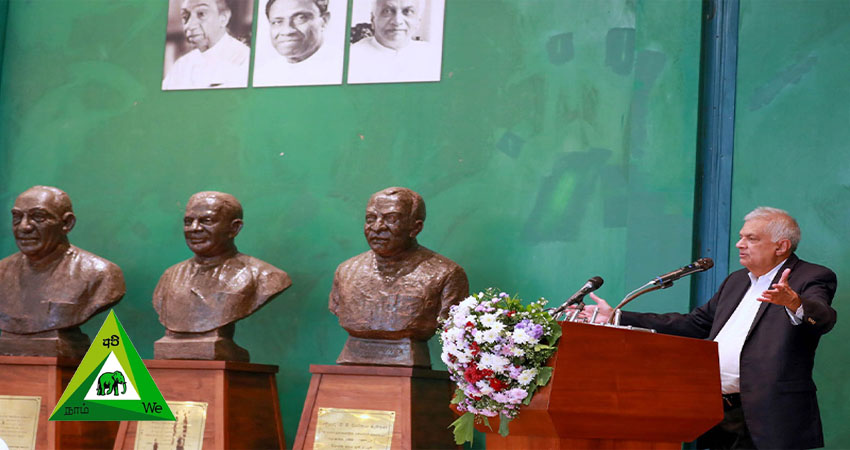
- None of the political parties in our nation possesses a comprehensive strategy to propel our country forward.
- Persisting with out-dated political practices will lead to another economic collapse.
- If there’s an alternate plan to advance the economy, please present it.
- Alternatively, endorse the Economic Transformation Act- President.
President Ranil Wickremesinghe stressed that with the stabilization of the country’s economy; there should be no inclination towards traditional politics. He underscored that the country can only be moved forward through a structured plan.
Hence, the President urged everyone to endorse the government’s program without resorting to criticism. He remarked that while criticizing is effortless, finding solutions is challenging.
Addressing the gathering at the distribution of appointment letters for United National Party (UNP) seat organizers held at Sirikotha party headquarters (02), he highlighted that no political party currently possesses a viable plan for bringing the country forward. Consequently, he encouraged anyone with such a plan to present it, and if not, to endorse the Economic Transformation Law for the future of the country.
The President remarked that while criticisms come easily, finding solutions is challenging. He emphasized that no one should make hollow statements for political gain, especially during a period when efforts are underway to assume governance and propel the nation forward.
President Ranil Wickremesinghe, adding further commentary, stated,
Four years ago, we entered an election driven by a singular issue: the dire state of our country’s economy. The repercussions of the Budget 2020 tax cuts were clear to us: a loss of revenue, a drain on foreign exchange. We emphasized the urgent need for a USD 03 billion reserve, but our message was met with scepticism. Some of ours departed to establish the SJB, without fully understanding our messages.
While the Janatha Vimukthi Peramuna (JVP) and Sri Lanka Podujana Peramuna (SLPP) mocked and criticized us. The United National Party (UNP) stood alone. However, we did not falter. Our party is committed to truth, no matter how difficult it may be to convey.
If we had found that money together back then, we would not be suffering like this today. Our economy would not be on the verge of collapse. When we faced trouble and sought help from other countries, India came to our aid with only USD 3.5 billion. That was only USD 500 million more than what we initially anticipated. It is no surprise that the value increased after two years. In 2020, it was only USD 03 billion. With that USD 3.5 billion, we managed to keep the economy afloat for one and a half years. If the United National Party had been elected to receive that USD 03 billion in 2020, our country would not be in such dire straits.
There was no food, no fertilizer, no fuel, no factories, and no sources of income. The impact was widespread. That’s when the struggle began, directed against the government of SLPP. However, on May 09, when they reached Galle Face, Opposition Leader and MP Anura Dissanayake were ousted.
Former President Gotabaya Rajapaksa proposed to Mr. Sajith Premadasa to assume the role of Prime Minister after the resignation of Prime Minister Mahinda Rajapaksa. However, he declined the offer. If Mr. R. Premadasa or Mr. J.R. Jayawardena were in charge, this opportunity would not have been missed. That is the essence of the true United National Party.
Janatha Vimukthi Peramuna also faltered. None of them had a viable solution. Their adherence to old politics and deceit left them without answers.
I fearlessly embraced the role of Prime Minister because I have a solution with me. I acted decisively, knowing that our country’s economy could be revitalized if we secured the promised USD 03 billion. From that point on, I dedicated myself to advancing the country’s economy. The impact of these efforts was evident in the joyful celebrations of Christmas 2023, the last Sinhala Tamil New Year, and Vesak.
Today, farmers are reaping the rewards of a bountiful harvest. However, our journey out of this crisis is not yet complete.
It is only through this approach that we can gradually restore normalcy to day to day life. The “Aswasuma” program has provided threefold benefit to our people than “Samurdhi”. Additionally, rice subsidies have been extended to low-income individuals and the “Urumaya” program grants free land rights. In the upcoming month, 50,000 low-income residents living in Colombo flats will receive rightful ownership of their homes.
When considering the state of our country today, by the end of 2023, our debt had soared to USD 83 billion, which equates to Rs. 28,000 billion. This figure surpasses our total Gross Domestic Product. It’s challenging to escape such debt when it surpasses our annual income. To tackle this, we must forge ahead by generating new sources of revenue. We have entered into an agreement with the International Monetary Fund (IMF) outlining how we can achieve economic stability over the next five years. It is crucial that we adhere to this agreement; otherwise, we risk losing their support in the future.
We have been requested to allocate time between 2027 and 2042 for the repayment of our foreign debt. Consequently, we must strategize on advancing our economy. This involves not only settling the current loan but also addressing the on-going need for foreign borrowing due to our reliance on imports.
Subsequently, the existing USD 83 billion loan will escalate further, leading to another economic crisis within the next five years. Therefore, our primary concern should be on finding ways to progress. This stands as our main challenge presently.
To address this challenge, we are introducing new legislation. I urge all parties not to evade this issue; it is detrimental for both opposition and ruling parties to ignore it. Similarly, the media should not turn a blind eye to this problem. It’s essential for everyone to acknowledge and address this issue.
As the United National Party, we played a crucial role in rescuing the country from this crisis along with all other MPs. Now, it is imperative that we continue to move forward. Despite this, none of the parties have yet presented their programs, indicating a lack of readiness. However, as a government, we are actively working to formalize and enact the agreements made with the International Monetary Fund (IMF) and other friendly nations by submitting them to parliament for legal approval.
These proposed laws aim to transform our economy from one reliant on imports to one focused on exports. Only by adhering to these objectives can our nation progress.
Hence, it is essential that we address the debt, which currently exceeds 100% of our Gross Domestic Product (GDP), and reduce it to 95% by 2032. This is a critical milestone that everyone should be aware of; as it represents the next challenge we must tackle.
Furthermore, our Gross Domestic Product should achieve a growth rate of 5% by 2027. To facilitate rapid development, this growth rate must be sustained at 8% for a minimum of 10 years. Concurrently, unemployment should be reduced to 5% by 2025.
Transforming into an export-oriented economy, our export revenue should comprise 25% of the Gross Domestic Product by 2025, escalating to 40% by 2030, and ultimately reaching 60% by 2040. This trajectory aligns with our goal of establishing our country as an export-oriented economy by 2040.
Achieving this goal necessitates attracting foreign investment. By 2030, foreign investment should constitute at least 5% of our economy. Simultaneously, these foreign investments should be directed towards fostering our export economy.
With adherence to these objectives, we possess the capacity to advance as a country. I invite everyone to voice their agreement or dissent regarding these goals. I urge all to endorse the economic transformation law, or alternatively, propose any other viable program.
Relying solely on the International Monetary Fund (IMF) is our only feasible option for acquiring funds. Merely discussing alternatives without a tangible solution is futile. Some suggest renegotiating with the IMF, likening it to asking a moneylender for an extension, but this analogy oversimplifies the complexity of the situation. It took us two years to deliberate on this matter.
Hence, instead of disseminating misinformation, I implore those with a formal program to either present it or endorse the current one. Back in 2020, when we first proposed this, it was met with rejection from all sides, leading us to our current predicament. Therefore, rejecting the current program with the International Monetary Fund (IMF) would only exacerbate our situation.
It’s imperative that we devise a plan to revive the economy. Given the absence of such a plan from any party, I appeal to all to unite and support the economic transformation law of our country. Criticism may be easy, but providing viable solutions is far more challenging. Hence, I urge everyone to contribute constructive solutions instead of merely criticizing.
